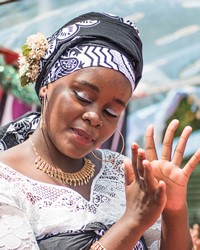Comorian, Maore in Mayotte

Photo Source:
Bertrand Fanonnel - Wikimedia
Creative Commons
|
Send Joshua Project a map of this people group.
|
| People Name: | Comorian, Maore |
| Country: | Mayotte |
| 10/40 Window: | No |
| Population: | 217,000 |
| World Population: | 224,400 |
| Primary Language: | Comorian, Maore |
| Primary Religion: | Islam |
| Christian Adherents: | 0.90 % |
| Evangelicals: | 0.12 % |
| Scripture: | New Testament |
| Ministry Resources: | Yes |
| Jesus Film: | Yes |
| Audio Recordings: | Yes |
| People Cluster: | Bantu, Swahili |
| Affinity Bloc: | Sub-Saharan Peoples |
| Progress Level: |
|
Introduction / History
Mayotte Comorian people are a blend of settlers from the past: Iranian traders, mainland Africans, Arabs, and Malagasy. Because of poor economic conditions, the islands receive monetary and technical support from other countries. Some seek their fortune in nearby countries like Madagascar.
What Are Their Lives Like?
Most Maore Comorians in Mayotte work as farmers or fishermen, while some raise cattle, sheep, goats, and donkeys. Some work in industry or in jobs relating to tourism. The basic diet of Comorians consists of rice, potatoes, corn, fish, coconuts, and bananas. Other crops they grown include sweet potatoes, citrus fruits and pineapples. Although young people wear Western style clothing, traditional clothing is still common among the adults. In town, a Comorian man will typically wear a white cotton garment and a knee-length shirt, sometimes with a white jacket and a white skull cap. When he goes out of town, he wears a long cloth sarong (colorful skirt). Most women wear long, colorful cotton dresses, with bright shawls as face coverings. Other women prefer wearing black robes that cover their heads. Polygamy is an acceptable practice among Mayotte Comorians in Madagascar. Children are expected to help with the farming, fishing, and caring of the animals. Mayotte Comorians enjoy dancing, singing, and playing instruments, especially horns and drums.
What Are Their Beliefs?
Maore Comorians in Mayotte are Muslims who believe that the one, supreme God, Allah, spoke through his prophet, Mohammad, and taught mankind how to live a righteous life through the Koran and the Hadith. These people depend upon good works to pay the penalty for their sins. They depend upon the spirit world for their daily needs because they regard Allah as too distant. They believe that Allah may determine their eternal salvation, but the spirits determine how well they live in their daily lives. Consequently, they must appease the spirits. They often use charms and amulets to help them with spiritual forces.
What Are Their Needs?
The physical needs of the Maore Comorians are numerous. Major problems on the Comoros Islands include poverty, disease and hunger. Educational levels are low. There is a shortage of hospitals and doctors, and many people suffer from illnesses and chronic malnutrition. Because of a poor water supply, good hygiene is lacking. Such problems contribute to a high death rate, especially among young children. The spiritual needs of the Maore Comorians in Mayotte are even greater than their physical needs. Though freedom of religion exists in Madagascar, evangelism is not well received by these Muslims. Their commitment to Islam coupled with involvement in occult practices has made these people difficult to reach.
Prayer Points
Bible resource materials abound in French, the primary language of this people group, however, religious block of Islam prohibit access for this needy people. Pray that they will transcend these barriers. Ask Lord Jesus to raise a strong church among Maore Comorian people on the island of Manotte that will faithfully spread the good news of the gospel of grace to families.